Arcanum is a traditional fantasy role-playing game with several distinctive traits, including a great premise and a nonlinear, open-ended role-playing system. But the game's broad design brings with it a host of problems that may not be easy for you to get past. Three years in the making, Arcanum is the fledgling effort of Troika Games, a small studio founded by several key members of the team that created Fallout-- Interplay's memorable, highly enjoyable postapocalyptic role-playing game--back in 1997. Arcanum bears many noticeable similarities to Fallout. Like its predecessor, it gives you plenty of freedom within its open-ended world--the freedom to approach the game's many challenges by using a variety of courses of action, from civil to brutal. Unfortunately, Arcanum suffers from a host of rather serious flaws, including an overall lack of polish, which can end up making the game disappointing more often than enjoyable for some players. These problems veil what's an otherwise captivating and immersive role-playing experience.
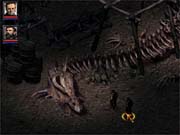
Perhaps the most notable aspect of Arcanum is its setting: The game takes place in a fantasy world undergoing an industrial revolution, much like the United States' industrial revolution during the Victorian era in the late 19th century. Suddenly, trains, electricity, and flintlock pistols have invaded a world previously ruled by swords and sorcery. Meanwhile, social tensions are mounting--previously segregated races, such as elves, dwarves, gnomes, and half-orcs, are trying to coexist in newly built metropolises. It's a great concept, and it's just as inspired as Fallout's campy yet violent setting.
You play Arcanum from an isometric perspective similar to that found in games such as Baldur's Gate II, Diablo II, and countless others. Like in most role-playing games, your time in Arcanum is mostly spent traveling from place to place, engaging in (or circumventing) combat, and talking to various nonplayer characters. Creating your own character at the beginning of the adventure (or choosing from one of the many prefabricated ones) is a lot of fun. The game's depiction of various traditional high-fantasy races within its unique setting is very well done--you'll enjoy just cycling through all the beautifully hand-painted character portraits available. There are no character classes as such in Arcanum--you can gain proficiency in various combat skills, social skills, and stealth skills; and you can learn spells in many different schools of magic ("magick" in the game) and even gain technical proficiency in various scientific disciplines.

One of the central themes in Arcanum is the conflict between magic and technology. This conflict constantly manifests itself in the game, such that a magically proficient character won't be able to effectively use technology, whereas a skilled technologist will make a poor magic user (and spells will fizzle when cast on the character). On top of having to choose between the path of magic or technology (or neither), you'll even have the option to give your character one of many backgrounds (raised by monks, sold his or her soul, ran away with the circus, and so forth), and these affect his or her vital statistics in various ways. Given all the different options, chances are you'll enjoy this initial step of creating your in-game persona, even though it's a little overwhelming at first.
While many of the quests in the game are fairly involved and do indeed allow for multiple solutions to suit different types of characters, at the same time, many of the game's situations necessarily involve combat. Combat is a major part of Arcanum, and for the most part, it's simply awful. You can choose from turn-based or real-time combat and readily toggle between the two, but neither option works well. Real-time combat happens in a frantic blur, as all parties involved hack away at each other to the death. The haphazard, too-quick animation makes Arcanum's battles look unintentionally comical--it's like watching people mill about stiltedly in some turn-of-the-century movie played at double speed. Unfortunately, this doesn't seem to be a deliberate effect, since there's nothing flattering about the dated, washed-out, low-resolution graphics found throughout Arcanum. Since the real-time combat is practically uncontrollable, you'll usually have to stick with the turn-based option. It's a very basic system that lacks meaningful tactical options and essentially limits you to pounding on the enemy by attacking as many times as your total number of action points will allow. As in the Fallout games, you can't even control your party members directly, though you can give them a few basic battle orders.
The combat is poorly balanced--characters with high strength and dexterity can easily take on swarms of powerful enemies with just a light melee weapon or even without one, and they will also gain experience levels faster than most any other type of character, because experience in Arcanum is gained not from defeating enemies, but just from hitting them. Of further note, party members gain levels only when you do, but you don't gain any experience when they hit--this reiterates the superiority of lone melee fighters over other possible character types, who'll either have more trouble successfully hitting foes or will rely on their party members to help do the dirty work. Meanwhile, a thief, a magic user, or even a technologist armed with some newfangled rifle might have a much more difficult time in many of the game's inevitable battles. Fortunately, such characters do have some means to bypass a lot of the combat.
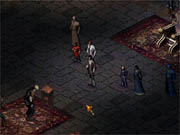
There are a lot of spells in Arcanum--magic users can learn up to five spells in more than a dozen different schools. Casting spells uses up your character's fatigue points--and getting hurt makes you lose fatigue points, too. When you run out, you fall unconscious. So a reckless mage might spend all his energy trying to damage several assailants with spells, leaving himself winded and very vulnerable (luckily, fatigue points may be quickly recovered by quaffing potions or by simply resting). Besides having access to combat spells, magic users also have access to a host of miscellaneous spells that can be used to avoid combat and to otherwise assist the caster with many other obstacles and situations. As such, magic users are perhaps the most flexible of all the types of characters in the game.
Technologists aren't quite so well off and are relatively difficult to play. It's partly justifiable by the game's context, but there's actually very little technology to be found in Arcanum. Technologist characters will surely grow jealous as they're forced to ignore all the powerful magical equipment they'll find in their quest. Instead, their scientific disciplines allow technologists to combine common and not-so-common items to make new equipment (from bombs to light sources to skeleton keys, all replete with very amusing in-game descriptions). Technologists may be inclined to use firearms in battle, but unfortunately, guns in Arcanum are not just uncommon, but also generally quite weak, and ammunition is expensive to buy, as well as scarce--even if you learn how to make it. In addition, the guns are modeled with disappointing simplicity--inexplicably, these weapons never have to be reloaded, and there's only one type of generic ammunition that's used for all of them. Even the advantage of long range doesn't amount to much, since battles are usually in close quarters.
Any character can learn the basics of, or grow to specialize in, various stealthy skills, including prowling, pickpocketing, trap disarming, and lock picking. Any character can learn how to backstab his foes for extra damage--a devastating ability for a fleet-footed fighter. Characters can also gain proficiency in skills like haggling and persuasion.
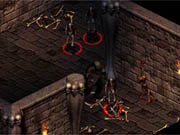
Regardless of what sort of character you opt for, controlling the game should have been simpler. As it is, you have a limited ability to scroll your view, presumably based on your character's field of vision. This feels very confining and rather awkward, as you'll constantly be using the keyboard arrow keys to scroll around while moving your character with the mouse. It's an ungainly system, and so is much of the interface, which takes up a large portion of the screen and isn't intuitively laid out. This, along with the lack of in-game help or a tutorial, means you'll often have to consult the manual at first, though you probably won't mind the diversion since the manual is a lot of fun to read.
Besides the issues with the controls and interface, the game doesn't always handle less predictable actions very well, despite the fact that it encourages experimentation. Arcanum can be buggy--strange things will happen if you perform certain quests out of sequence or don't solve them in whatever ways the designers predicted you might. You'll more than likely encounter a variety of bugs and glitches as you play, which are mostly just irritating (for instance, some dialogue will loop) but can be exasperating (the game can crash, or your save-game files may even become corrupted). Perhaps the worst thing about these bugs is that they can greatly undermine your suspension of disbelief--you'll wonder whether you're doing everything "right" to keep the game running as smoothly as possible. Speaking of not running smoothly, in spite of the crude graphics, you may still experience sporadic slowdowns and pauses in the game's performance, even if you have a fast system.
No one aspect of Arcanum is particularly successful. Much of the game consists of running from one homely location to another and performing all manner of menial quests for people who act like they can't be bothered to do these things themselves. The game's rather convoluted story has some interesting points, particularly when it takes a few twists toward the conclusion; but it unfolds almost exclusively through dialogue presented in white text that floats over characters' heads. Also, if by chance you're not paying close attention to what's being said, you'll find that completing some of the quests in the game will prove very difficult. While you do have a logbook that tracks various quests you take on and rumors you hear, the limited details it provides are often almost useless.
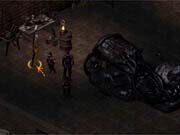
On their own terms, the various places you'll explore in Arcanum tend to look uniformly similar, courtesy of the game's generally poor graphics. The design of the game's various dungeons and catacombs is exceedingly simple and bland. Arcanum is a fairly long game, and after you finish it the first time, you'll find that few of its places and characters seem memorable. Instead, you'll find that the actual experience of playing through the game in different ways is what's memorable and worthwhile. The way that the game shifts to accommodate your play style is actually quite impressive, and you'll pick up on this only if you actually try the game as different characters. You'll then notice how nonplayer characters respond differently to you depending on your race, appearance, intelligence, manner of speech, and gender. Combat will either be the brunt of the challenge or hardly any of it. Locked doors may be a difficult obstacle or a joke. Different quests will be available to you depending on who you are.
Arcanum's soundtrack is also memorable. The musical score relies almost exclusively on string instruments and sets the mood nicely in certain scenes. Unfortunately, the soundtrack is limited and can get repetitive-- and will likely have outstayed its welcome by the time you've reached the end of the game. The game's simple sound effects aren't worth mentioning in detail, though the occasional use of speech (to lend personality to a handful of the game's key characters) is mostly well done. You'll wish there were a lot more characters that spoke.
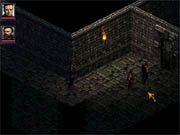
Maybe it's for the best that some aspects of Arcanum seem so dated. Those who manage to get past its drab presentation will find a lot to like in its unique setting, open-ended gameplay, and long, replayable single-player adventure. Besides all this, Arcanum has a few other interesting features, like fate points. During the game, you'll gain only a precious few of these points, which you can use at any time to tilt the odds in your favor instantly and unequivocally, effectively giving you a limited ability to cheat. The game even includes a module-based multiplayer mode (along with a built-in game server browser) as well as a scenario editor that you can use to create new dungeons, towns, and such. These features could dramatically extend Arcanum's play life for some players.
At a glance--even after a while--Arcanum can seem disappointing. It's not for everyone; its strengths aren't in any of its superficial qualities, and even its story and its characters aren't particularly noteworthy. Important parts of the game, like the combat, are decidedly flawed, and none of it is very polished. Thus, if you simply play it once, straight through, which is typically all you need to do with many other games, then you might have little to show for the experience once it's finally over. On the other hand, if you're serious about role-playing games--so serious that you don't care about graphics but instead just want to immerse yourself in a different world and try to explore it, perhaps even exploit it, as fully as possible--then Arcanum is well worth the investment of time, money, and effort. Just as its premise is unusual, so too is Arcanum completely unusual--newfangled even--in its machinelike way of how it gives you back only as much as you're willing to put into it.